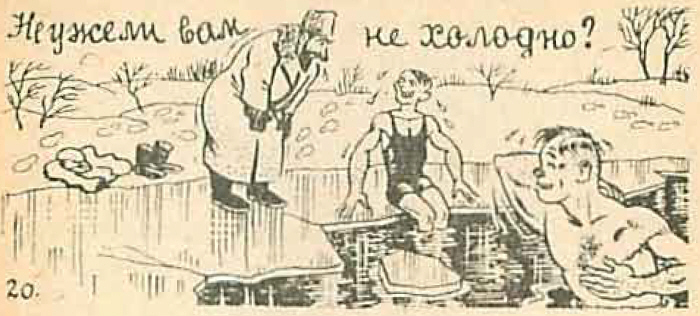
|
Languages |
| Russian for English speakers 20 |
 |
| Lesson 20 |
|
Russian |
English Английский |
|
|
56 - пятьдесят шесть |
fifty six |
|
|
57 - пятьдесят семь |
fifty seven |
|
|
58 - пятьдесят восемь |
fifty eight |
|
|
59 - пятьдесят девять |
fifty nine |
|
|
Двадцатый (20-й) урок |
Twentieth lesson |
|
|
УРОК НОМЕР ДВАДЦАТЬ (№20) |
Lesson number twenty (#20) |
|
| Холодно! | (It is) cold! | |
| 1 | Что вы гуляете без пальто! | What, you go-out without (an) overcoat! |
|
Что это вы гуляете без пальто! |
AK : You can use Что
это [что-эта]
instead of only что
|
|
| 2 |
Неужели (1) вам не холодно? |
Really, are you [to you (is it)] not cold? |
|
AK : the meaning is "Really, isn't it cold to/for you?" |
||
| 3 | Немного холодно, но ничего; | A little cold, but (it is) nothing; |
| AK : this means "Cold a little, but it's nothing." | ||
| 4 | пальто у меня не готово; | my overcoat [for me overcoat] (is) not ready; |
| 5 | портной мне его завтра принесёт. | (the) tailor will-bring it to me tomorrow. |
| 6 | Нельзя без пальто; | It-is-impossible (to do) without an overcoat; |
| мороз уже сильный; не шутка. | (the) frost (is) already strong; (it is) no joke. | |
| 7 | Но я вижу, | But I see |
| что у вас есть всё-таки галоши (2). | that at any rate you have galoshes. (overshoes), | |
| 8 | А у вас шуба великолепная. | But you have a splendid pelisse. |
|
AK : шуба is a fur coat |
||
| 9 | Шуба эта (3) уже старая; | This pelisse (is) already old. |
| 10 | у меня другая есть, новая. | I have another, (a) new (one). |
| 11 | Защищаться надо вовремя, |
One must protect-oneself [to defend oneself (is) necessary] in-time, |
|
AK : meaning is "but you should protect-yourself when it's needed". |
||
| не правда ли? (4). | (is it) not true [(the) truth]? | |
| 12 | Зима теперь очень близка; | Winter (is) now very near; |
| 13 | не сегодня - завтра будет первый снег (5); | Very soon [not to-day to-morrow] (the) first snow will fall [be]. |
|
AK: meaning is
"very soon, there'll be a first snow". |
||
| 14 | и тогда будет уже поздно. | and then (it) will-be too [already] late. |
| AK: meaning is "and then, it'll be already late". | ||
| 15 | неужели? готовый; мороз; без. | really? ready; frost; without. |
| 16 | великолепный; старый; старая; старое. |
splendid; old (masculine, feminine, neuter) |
| 17 | новый; новая; новое; сильный, сильная, . |
new (masculine, feminine, neuter); strong (masculine, feminine, neuter) |
| 18 | немного; поздно; близко (6); холодно. | A little; late; near; cold. |
|
Песня |
A song |
|
| 19 |
Кипучая, могучая |
Seething, mighty |
|
AK: кипучая ~ boiling |
||
| Никем непобедимая (7), | invincible (by nobody to-be-vanquished). | |
|
AK: This means "defeatable by nobody". |
||
| 20 | Страна моя, Москва моя,
Ты самая любимая. |
My country, my Moscow Thou most [very] beloved. |
|
AK : Ты самая любимая means "You are the most beloved". |
| NOTES. |
AK-NOTES |
|
| 1 |
Неужели
formed with не, not,
уже,
already, and the interrogative particle
ли, |
Неужели = whether it is...? |
| 2 | Галоши or калоши, rubber galoshes which are worn over the shoes. |
They are to be put over валенки - felt boots, to protect them from water. |
| 3 | Шуба эта
or эта шуба.
The order of words is much less strict in Russian than in English. |
The order of words is, still, important. |
| 4 |
Pronounce the two щ (sh'tch) in
защищаться, very indistinctly,
|
защищаться =
to protect oneself |
|
— In вовремя,
the о is
added to в for
euphony. |
In the original book вовремя is written во время, but it's one word now. |
|
|
Не правда ли? (Is it) not true [(the) truth]? |
In the original book it's written Не правда-ли? |
|
| 5 |
Снег,
show, is masculine; so is мороз,
frost; |
|
| 6 |
Близко:
near (adverb); |
близка
needs explanation. |
| 7 |
Никто:
nobody |
Победить кого-то is to defeat someone. |
|
Tweested English Section PRONUNCIATION.
|